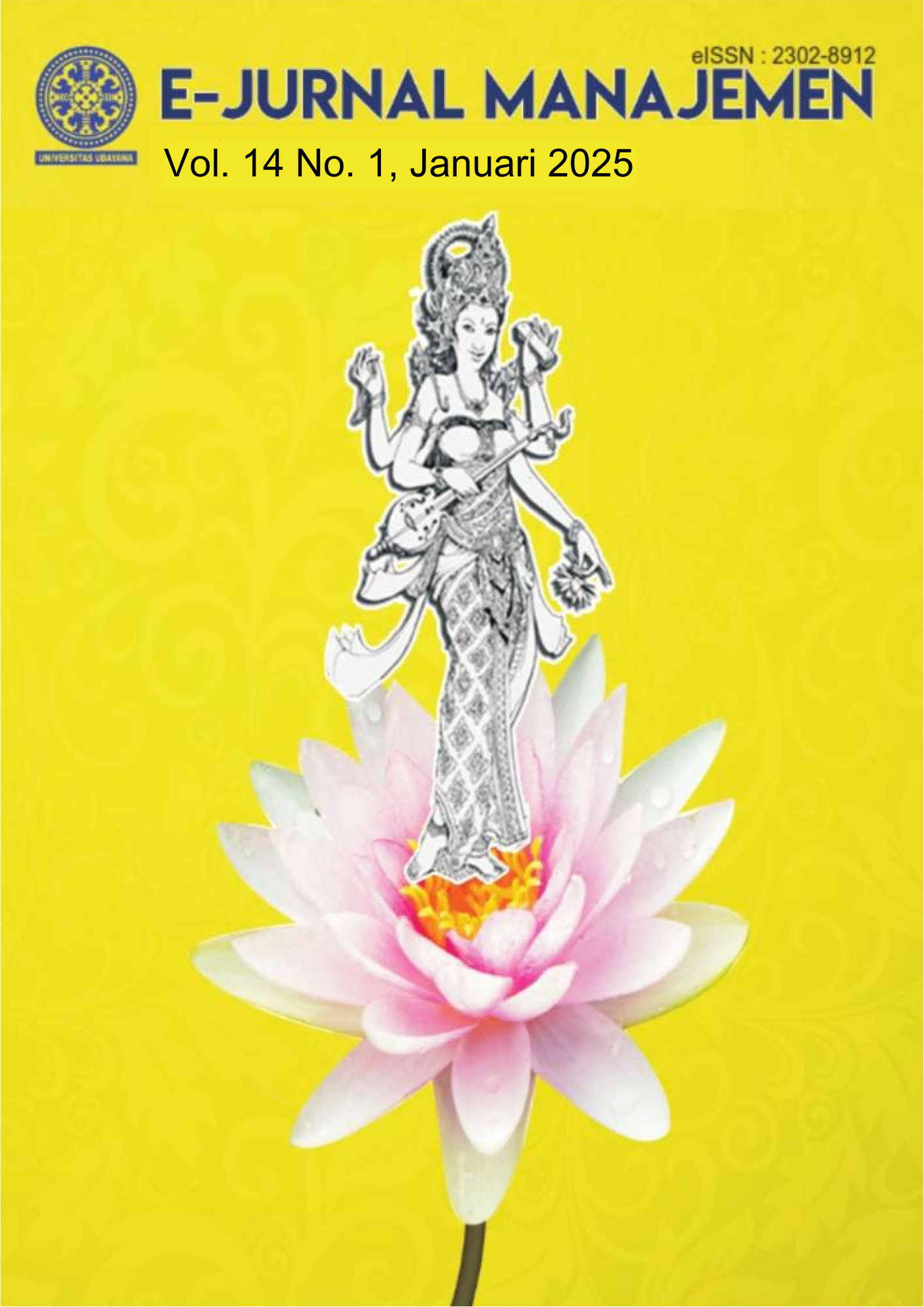LEBIH DARI SEKADAR TREN: PENGARUH FOMO (FEAR OF MISSING OUT), PERBANDINGAN SOSIAL, DAN MATERIALISME PADA PERILAKU BUY NOW PAY LATER GEN Z
Abstract
Perilaku konsumen di Indonesia semakin dipengaruhi oleh social comparison, fear of missing out (FoMO), dan materialism, yang mendorong adopsi metode pembayaran "Buy Now, Pay Later" (BNPL). Penelitian ini bertujuan untuk mengkaji hubungan antar variabel tersebut serta menjelaskan bagaimana faktor sosial memengaruhi pola konsumsi. Data dikumpulkan melalui survei terhadap 120 responden berusia 18-40 tahun yang menggunakan BNPL dalam enam bulan terakhir, dan dianalisis menggunakan Partial Least Squares Structural Equation Modeling (PLS-SEM) selama tahun 2023. Temuan utama menunjukkan bahwa social comparison memengaruhi FoMO dan materialism, yang keduanya secara signifikan berkontribusi pada penggunaan BNPL. Penelitian ini menyimpulkan bahwa BNPL menjadi alternatif pembayaran yang didorong oleh tekanan sosial. Implikasinya meliputi perlunya regulasi untuk mengelola penggunaan BNPL secara bertanggung jawab dan peluang bisnis untuk memanfaatkan tren ini.
Consumer behavior in Indonesia is increasingly influenced by social comparison, Fear of Missing Out (FoMO), and materialism, driving the adoption of the "Buy Now, Pay Later" (BNPL) payment method. This study aims to examine the relationships among these variables and explain how social factors shape consumption patterns. Data were collected through surveys of 120 respondents aged 18-40 who had used BNPL in the past six months and analyzed using Partial Least Squares Structural Equation Modeling (PLS-SEM) during 2023. Key findings reveal that social comparison influences FoMO and materialism, both of which significantly contribute to BNPL usage. The study concludes that BNPL is a payment alternative driven by social pressures. Its implications include the need for regulations to manage BNPL responsibly and business opportunities to leverage this trend.
Downloads
References
Dinh, Thi Cam Tu, and Yoonjae Lee. 2022. “‘I Want to Be as Trendy as Influencers’ – How ‘Fear of Missing out’ Leads to Buying Intention for Products Endorsed by Social Media Influencers.” Journal of Research in Interactive Marketing 16(3):346–64. doi: 10.1108/JRIM-04-2021-0127.
Festinger, Leon. 1954. “A Theory of Social Comparison Processes.” Human Relations 7:117–40.
Ger, Guliz, and Russel W. Belk. 1996. “Cross-Cultural Differences in Materialism.” Journal of Economic Psychology 17(1):55–77. doi: 10.1016/0167-4870(95)00035-6.
Hanus, Michael D., and Jesse Fox. 2015. “Assessing the Effects of Gamification in the Classroom: A Longitudinal Study on Intrinsic Motivation, Social Comparison, Satisfaction, Effort, and Academic Performance.” Computers and Education 80:152–61. doi: 10.1016/j.compedu.2014.08.019.
Heaney, Joo-Gim, Ronald E. Goldsmith, Wan Jusoh, and Jamaliah Wan. 2005. “Heaney2005.Pdf.” (December 2014):37–41. doi: 10.1300/J046v17n04.
Hussain, Sajjad, Ali Raza, Ali Haider, Muhammad Ishtiaq Ishaq, and Qurat ul ain Talpur. 2023. “Fear of Missing out and Compulsive Buying Behavior: The Moderating Role of Mindfulness.” Journal of Retailing and Consumer Services 75(August):103512. doi: 10.1016/j.jretconser.2023.103512.
Islam, Tahir, Zaryab Sheikh, Zahid Hameed, Ikram Ullah Khan, and Rauf I. Azam. 2017. “Social Comparison, Materialism, and Compulsive Buying Based on Stimulus-Response-Model: A Comparative Study among Adolescents and Young Adults.” Young Consumers 19(1):19–37. doi: 10.1108/YC-07-2017-00713.
Liu, Pei, Jinglun He, and Aimei Li. 2019. “Upward Social Comparison on Social Network Sites and Impulse Buying: A Moderated Mediation Model of Negative Affect and Rumination.” Computers in Human Behavior 96(601):133–40. doi: 10.1016/j.chb.2019.02.003.
Luo, Xueming. 2005. “How Does Shopping with Others Influence Impulsive Purchasing?” Journal of Consumer Psychology 15(4):288–94. doi: 10.1207/s15327663jcp1504_3.
Nga, Joyce K. h., Lisa H. l. Yong, and Rathakrishnan Sellappan. 2011. “The Influence of Image Consciousness, Materialism and Compulsive Spending on Credit Card Usage Intentions among Youth.” Young Consumers 12(3):243–53. doi: 10.1108/17473611111163296.
Pang, Hua, and Li Quan. 2024. “Assessing Detrimental Influences of Fear of Missing Out on Psychological Well-Being: The Moderating Role of Self-
Presentation, Upward Contrast, and Social Media Stalking.” Applied Research in Quality of Life 19(3):881–904. doi: 10.1007/s11482-024-10272-6.
Penman, Sarah, and Lisa S. Mcneill. 2008. “Spending Their Way to Adulthood: Consumption Outside the Nest.” Young Consumers 9(3):155–69. doi: 10.1108/17473610810901598.
Pirog, Stephen F., and James A. Roberts. 2007. “Personality and Credit Card Misuse among College Students: The Mediating Role of Impulsiveness.” Journal of Marketing Theory and Practice 15(1):65–77. doi: 10.2753/MTP1069-6679150105.
Przybylski, Andrew K., Kou Murayama, Cody R. Dehaan, and Valerie Gladwell. 2013. “Motivational, Emotional, and Behavioral Correlates of Fear of Missing Out.” Computers in Human Behavior 29(4):1841–48. doi: 10.1016/j.chb.2013.02.014.
Richins, Marsha L., and Scott Dawson. 1992. “A Consumer Values Orientation for Materialism and Its Measurement: Scale Development and Validation.” Journal of Consumer Research 19(3):303. doi: 10.1086/209304.
Suls, Jerry, Christine A. Marco, and Sheldon Tobin. 1991. “The Role of Temporal Comparison, Social Comparison, and Direct Appraisal in the Elderly’s Self‐Evaluations of Health.” Journal of Applied Social Psychology 21(14):1125–44. doi: 10.1111/j.1559-1816.1991.tb00462.x.
Tsang, Jo Ann, Thomas P. Carpenter, James A. Roberts, Michael B. Frisch, and Robert D. Carlisle. 2014. “Why Are Materialists Less Happy? The Role of Gratitude and Need Satisfaction in the Relationship between Materialism and Life Satisfaction.” Personality and Individual Differences 64:62–66. doi: 10.1016/j.paid.2014.02.009.
Vansteenkiste, Maarten, Bart Duriez, Joke Simons, and Bart Soenens. 2006. “Materialistic Values and Well-Being among Business Students: Further Evidence of Their Detrimental Effect.” Journal of Applied Social Psychology 36(12):2892–2908. doi: 10.1111/j.0021-9029.2006.00134.x.
www.nextmsc.com. 2024a. “Indonesia Buy Now Pay Later (BNPL) Market by Channel (Online and Point of Sales (POS)), by Application (Retail Goods, Media & Entertainment, Healthcare & Wellness, Automotive, Home Improvement, and Others) by End User (Generation X, Generation Z/Millennia.” Retrieved (https://www.nextmsc.com/report/indonesia-buy-now-pay-later-bnpl-market).
www.nextmsc.com. 2024b. “Indonesia Buy Now Pay Later (BNPL) Market Is Expected to Reach USD 3944.9 Million by 2023.” Retrieved (https://www.nextmsc.com/news/indonesia-buy-now-pay-later-bnpl-market).
Xu, Yingjiao. 2008. “The Influence of Public Self-Consciousness and Materialism on Young Consumers’ Compulsive Buying.” Young Consumers 9(1):37–48. doi: 10.1108/17473610810857309.
Zheng, Xiaoying, Ernest Baskin, and Siqing Peng. 2018. “The Spillover Effect of Incidental Social Comparison on Materialistic Pursuits: The Mediating Role of Envy.” European Journal of Marketing 52(5–6):1107–27. doi: 10.1108/EJM-04-2016-0208.





















